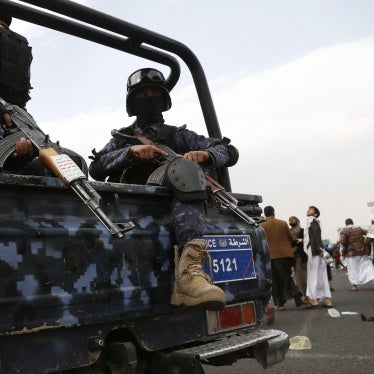Human Rights Watch welcomes the arrest today by French and German SFOR troops of indicted war crimes suspect Milorad Krnojelac.
"The arrest of persons indicted for war crimes by the International Criminal Tribunal for the former Yugoslavia (ICTY) is a basic precondition for the successful implementation of the Dayton Peace Accords," stated Holly Cartner, executive director of the Europe and Central Asia Division of Human Rights Watch. "We believe that this arrest by SFOR troops is a clear message to Radovan Karadzic and other indictees in the French SFOR sector that there is no alternative to facing justice in The Hague."
The sealed indictment, issued by the ICTY, accuses Krnojelac of beatings, murder, willful killing, willfully causing serious injury, cruel treatment and inhumane acts towards prisoners in the "KP Dom" prison camp in Foca. Under his authority over 300 prisoners are alleged to have been taken away and "disappeared." According to reports of survivors, who were recently interviewed by Human Rights Watch, Krnojelac, a teacher of mathematics by profession, was the manager of KP Dom from April 1992 until September 1993. One former prisoner called Krnojelac the "top director" in KP Dom during this period, alleging that Krnojelac had substantial decision-making power.
Reports from survivors of KP Dom (Kazneno-Popravni Dom - Criminal Rehabilitation House) are laden with gruesome tales of starvation, torture, intimidation and threats, beatings, and disappearances . One survivor reported to Human Rights Watch:
I was taken to KP Dom on April 17. There were 730 people in KP Dom during the time I was there. Every night at 8:00 they would come to the rooms to take people for interrogations. Prisoners would have to go to interrogations many times, but I only had to go once. [G]uards and police officers [came] to people's rooms every night at 8:00 and called people's names from a list...They would take some people to the former meeting room and beat them, and around 12 midnight we heard shooting and these people usually never returned. [...] Of the eighteen men in my room, only eight were left at the end. On average more that half of each room was killed or disappeared.
Another Bosniak survivor who was imprisoned in KP Dom for almost a year described the situation in KP Dom:
KP Dom opened [as a detention center] on April 18. Men from the ages of seventeen to eighty-five were held there. When I was brought there, there were already a hundred to 150 there. They were mostly from Donje Polje, the area around KP Dom....During April and May they brought around 600 men to KP Dom. Around 400 of them were taken away and disappeared. I think they were all killed. This happened between April and December 1992. They were taken away in small groups, mostly at night, and sometimes during the day by the guards, with the excuse of taking them to be exchanged....The army made decisions about what would take place. There were lists of people and prisoners were taken from the lists. One copy was in the hands of the director, and so the police and the director know who was taken away.
People were consistently taken away in small or big groups. The first big group was between June 13 and 30, 1992. Thirty-five people were taken at night. Before that men were taken at night and tortured. After that they disappeared. During the nights, when people were brought to the prison, some of them were in torture chambers, and when they were taken away, they were also tortured. The guards and military police were torturing them.
This witness confirmed that Milorad Krnojelac was the director of the facility, during which time numerous detainees disappeared.
Another Bosniak survivor of KP Dom told Human Rights Watch:
On September 17, they took thirty-five people ostensibly to pick plums, and they never came back. On September 25, they took twenty-five people, and they never came back. Later they took Muradif Music and nineteen others. That was on October 9, 1992. They never came back. I saw each time they took people away. They just called the names and took them away. Always two people came to call the names. They had army uniforms on. [...] My friend had been taken to the basement where he was beaten. I asked...one of the guards, if I could see my friend. He said I can see him for two minutes. He [the friend] was all bruised and black [...]. In the same room where [my friend] was, there was one guy hanging one meter off the floor at the wall. Ropes held him up there and on one side there was hot water falling on one of his shoulders and on the other side there was cold water and he was crying. I did not know him but he was suffering a lot. It was really hot water, and he was really suffering and he was screaming. [The guard] told me not to tell anyone what I saw.
Krnojelac' arrest is the sixth such action by NATO-led SFOR troops in Bosnia-Hercegovina. Despite these arrests, and several surrenders by indictees, at least 45 persons indicted by the ICTY remain at large.






